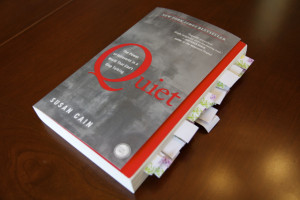 “So, if you’re such an introvert, how are you going to manage interacting with a hundred students each day?” — Dreamy
“So, if you’re such an introvert, how are you going to manage interacting with a hundred students each day?” — Dreamy
“Wait, you’re an introvert? Why do you hang out with us then?” — Anthony, eighth grader
I asked myself these questions, or variations of them, multiple times over the past few years. The best answer I can offer goes something like this: remember a few years ago when Beyoncé released an album called I Am … Sasha Fierce? While promoting the record she explained Sasha Fierce is her onstage personality who emerges during the superstar’s showstopping performances. Sasha is confident, in control, and a force to be reckoned with. In other words, as Beyoncé’s alter ego, Sasha owns it.
My teacher alter ego is named Queen LaTeacha. She takes the stage Monday through Friday from 7:50 a.m. to 11:17 a.m. The Queen is animated, expressive, outgoing, and – dare I say? – an extrovert. That said, however, by the end of my last class I am wiped. out.
Recharging begins at precisely 11:21 a.m., after my students have left and the hallways have cleared. I close my classroom door, sit down, and exhale. Sometimes I stare at the wall for a few minutes, sometimes I put on some music and begin puttering around the room, stacking chairs and tidying up. Organizing helps me feel in control, and that feeling, combined with a few moments of quiet , has so far helped me to refocus before taking on grading, planning, and preparing for the next day.
What I wondered about most was how does this switcheroo happen, exactly? How am I able to suddenly and seamlessly switch from my introverted self to Queen LaTeacha?
As usual Susan Cain comes to the rescue. Chapter nine of Quiet is simply revelatory. She profiles Professor Brian Little, a popular lecturer and professor whose work on personality and motivational psychology is groundbreaking. Little’s work helped me to identify teaching as one of my “core personal projects” (p. 209) and thus helped me to understand how these two parts of my personality work together in service of a larger goal or mission. I am motivated, passionate, and plain ol’ excited about this new path, and feeling this way enables my extroverted traits to take center stage.
How does this alter ego business affect parenting? Now more than ever I am acutely aware of the need to better manage my energy levels. And, as we’ve seen, I am not very good at this. It is critical I reserve energy for my own kids, not just the ones I teach. My husband needs some too, as do friends and other family members.
As Kathy notes, parenting is also a core personal project which requires loads of additional energy. So do I still feel crunched and pressured to be “on” most of the time? Of course. But here’s the thing: my job makes me happy, and this seems to offset some of the adverse effects of so much extroverting. As long as small chunks of the day can be reserved for recharging I am confident this new lifestyle will sort itself out. That’s the only way I can see these various pieces fitting together to create a healthy and unified whole.
Unless you, dear readers, have ideas. The Queen is taking any and all suggestions.
— Tiffany
————————
 School can actually be a great place to be an introvert – for students, I mean. Lots of structure, stretches of quiet where you’re expected to focus on your own work, and plenty of opportunities to read and write. But it can also be loud, chaotic, and severely draining.
School can actually be a great place to be an introvert – for students, I mean. Lots of structure, stretches of quiet where you’re expected to focus on your own work, and plenty of opportunities to read and write. But it can also be loud, chaotic, and severely draining.
That’s not just my perspective as an adult returning to volunteer (or sneaking in to drop off cupcakes). I have very clear memories of seventh grade and the relief I felt when I was finally deemed old enough to come home to an empty house. Before that I went to a series of babysitters after school with bunches of other kids, and while that was definitely fun (kind of like having a rotating group of extra siblings through the years), it added an extra couple hours of “on” time to the end of an already-long school day.
Middle school was also when all the angsty friend/boy drama kicked into high gear, and I don’t think it’s a coincidence that after school I gorged on alone time, happily watching Guiding Light, playing Tetris, and writing stories until the rest of my family got home. High school wasn’t much less draining in that respect – I can remember sighing to my mom that “At school you have to be nice to everyone all the time.”
So I think I’m extra aware that my little introvert needs her own downtime after school. Doodlebug’s only extracurricular activity right now is Brownies, and that’s one night each month. On top of a standing appointment she has once a week, that’s it. I would love to get her into an art class or swimming lessons, but I’m wary of messing with a schedule that already seems tight for her. On afternoons when I have to drag her on an errand or three, I grit my teeth and anticipate a dinnertime meltdown. Possibly from either one of us – it’s draining for me, too!
And after reading articles like this interview with our hero Susan Cain, I’m wondering more about ways Doodlebug can grab pockets of quiet time during the school day. Her class’s schedule seems to have several self-directed components, which is great, and they have reading time each day. But they are still sitting at tables, not desks, even though they’re third graders. I hope this ends next year – sometimes everyone just needs their own space, even extroverts.
Doodlebug has been lucky so far to get teachers who understand that she needs time to warm up and who push her just far enough. And I’m excited about the ways technology will let her and other younger introverts contribute in class at their own speed. I never felt comfortable jumping into a classroom debate at 90 mph, but I would have loved having a class blog or message board.
Or a Guiding Light message board! Ohhh, the hours I could have wasted after school on that!
— Kathy

